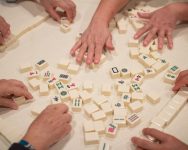
Mahjong is a great exercise for the brain. Yes! Yes! As a way to keep their brains healthy, it is highly recommended for the elderly.
The game is most commonly played mahjong online game with four players, although there are some variations that can be played with three in Japan, South Korea, and Southeast Asia.
It is a popular game in Asia, and it has become increasingly popular in Western countries. Mahjong can also be used online as entertainment. There are many variations in terms of the tiles and rules.
Studies show that mahjong can be a great way to keep your mind sharp. It is also recommended for the elderly to help maintain good brain health. Mahjong and chess are great brain games for the elderly, as they can improve the memory skills of people with degenerative brain diseases.
Mahjong requires cognitive skills, which can help slow down or treat dementia. To be successful, players must remain mentally sharp throughout the game. They need to be able to read clues from others and construct winning hands.
You don’t have to be old to play mahjong. Online mahjong can be fun for children and improve their concentration skills. It is a great way to teach children cognitive skills.
Studies show that this might improve mental health in older adults. Researchers at the University of Georgia found that playing mahjong regularly was associated with lower rates of depression among older Chinese adults.
It is beneficial to maintain a social life even into old age and adulthood. Mahjong requires at least three players. This is a great way to socialize with others and helps you develop better social relationships that will improve your mental health.
We also promoted this game to get more attention from people on social media. We targeted aged people and for this social media campaign, we tried to get facebook likes as much as we can from people who love to play mahjong.
Experimental procedure
Participants were randomly assigned to either a mahjong or control group using a computer-generated random numbers table that had a 1:1 allocation ratio. Over the course of three visits, all participants were evaluated.
The details of the study were discussed at the first visit and informed consent was obtained. Neuropsychological tests and patient information sheets were also taken. Neuropsychological testing was performed during the final two assessments, which were conducted in the sixth and twelfth weeks of the experiment.
Players Inclusion Criteria
* Must be 65 years old or older
* Diagnose and confirmation of mild cognitive impairment by self or nurses. Assessment with the Beijing version the Montreal Cognitive Assessment (MoCA–B) (cut-off range 17-23 [illiterate], 19-24 [elementary school], 25-25 [middle to high school and beyond]); Clinical Dementia Rating, 0.5-1.0.
* Previous experience with mahjong and knowledge, but not in the last 6 months.
* No handicap or disability that could affect mahjong play
Players Exclusion Criteria
* Inability to take part in mahjong because of disability (e.g., visual impairment, hearing impairment or other severe diseases).
* A psychiatric history
* A neurologic disorder that can affect cognitive function.
* Inability or unwillingness to adhere to the study’s timeframe.
* Major depression diagnosed using Geriatric Depression Scale-15.
Where can you play Mahjong?
You’re now a believer in the brain-strengthening goodness of Mahjong and are raring to go tickle some tiles. Finding a game to join is easier than ever.
Local Community Center–A perfect option for those wanting to get out and socialize, many local community centers offer both mahjong lessons and opportunities to play.
Solitaired–Even when you’re not feeling like in-person play, you can still satisfy your mahjong craving online.
Pogo.com–Throw out the tired, traditional tiles with themed tiles
OnlineMahjong247–There’s more than one way to play Mahjong, and this site will happily show you many more. Let curiosity get the best of you and try Mahjong Tower, Mahjong Chain, or even Six Triangle Mahjong.
Final Results
This study involved 69 elderly participants. Randomly, subjects were assigned to either the mahjong intervention (n = 35), or the control (_n =34). Seven individuals were removed from the mahjong intervention group, while six people from the control group were expelled, leaving 28 subjects in the mahjong and 28 in control groups. This article explains the process of selecting subjects.
Interesting Related Article: “Mens Sana: Tips to Refine Your Brain’s Health“

